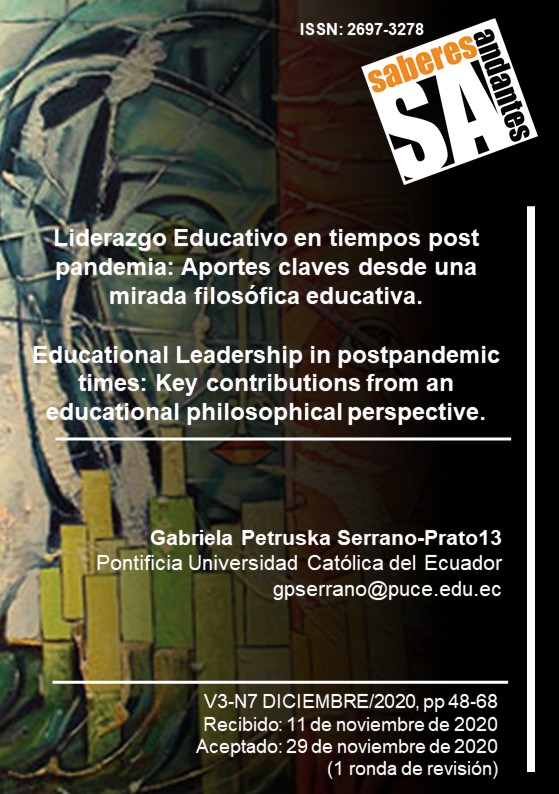Educational Leadership in Post-pandemic Times
Key contributions from an educational philosophical perspective
DOI:
https://doi.org/10.53387/sa.v3i7.58Keywords:
educational leadership, philosophy of education, ethics of care, post pandemicAbstract
The history of humanity has been marked by crises that have redefined society. Crises often have a double connotation, on the one hand they leave a painful mark, but on the other they can be catalysts for an unbearable renewal. Being an educational leader in times of uncertainty is a challenge, and if something has brought the COVID -19 pandemic, it is precisely the lack of certainties. However, opportune lights can be found to guide teaching practice and such leadership. This time has highlighted the importance of being flexible, of leaving homogeneous models and encouraging oneself to make reinventions. In this sense, this article seeks to be a space for reflection from a philosophical point of view that leaves both a critical and a hopeful spirit. Therefore, the general objective is proposed: To share the key contributions from an educational philosophical perspective for Educational Leadership in post-pandemic times. And the specific objectives: 1. Reflect on the importance of prioritizing what should be taught. 2. Analyze teaching methods in post-pandemic times. 3. Propose suitable spaces for learning.
Downloads
References
Aragay. X (2017). Reimaginando la educación. 21 claves para trasformar la escuela. Editorial: Ediciones Paidós
Concepts, L. (2016, August 25). 21st Century Skills Definition. Agosto, 2020, de ww.edglossary.org/21st-century-skil
Del Pozo, M. Et al (2016). Aprender hoy y liderar mañana. El Colegio Monserrat un futuro hecho presente. Tekman Education
Diamandis, P. H. Reinventing How We Teach Our Kids. Tomado agosto, 2020, de www.diamandis.com/blog/
Gedisa. Saiz, C. (2002). Pensamiento crítico. Conceptos básicos y actividades prácticas. Madrid: Síntesis
González, M. J. (2001). Introducción a la psicología del pensamiento (2ª ed.). Madrid: Trotta.
Levy, F. and Murnane, R. Dancing with Robots: Human Skills for Computerized Work. Tomado septiembre, 2020, from www.thirdway.org/report
Noodings, N. Care Is Political: Situating the ‘Ethic of Care’ in a Conceptual Framework (pp. 1 - 5).
Noddings, N. (2010). Caring in education. Ínfed, 2-4.
Ortiz Ocaña, A. (2013). Modelos pedagógicos y teorías del aprendizaje. Bogotá: Ediciones de la U. Obtenido de https://www.researchgate.net/profile/Alexander_Ortiz_Ocana/publicación/315835198_Modelos_Pedagogicos_y_ teorías_ delAprendizaje/links/58eafa4ca6fdccb4a834f29c/Modelos- Pedagogicos-y-Teorias-del-Aprendizaje.pdf
Perkins, D. (2008). La escuela inteligente. Del adiestramiento de la memoria a la educación de la mente. Barcelona
Quintana Torres, Y. E. (2018). Calidad educativa y gestión escolar: una relación dinámica. Dialnet, 259-281.
Swartz, R., Costa, A., Beyer, B., Reagan, R., & Kallick, B. (2013). El aprendizaje basado en el pensamiento. Cómo desarrollar en los alumnos las competencias del siglo XXI. Madrid: sm.
Tishman, S.; Perkins, D.; Jay, E. (2001). Un aula para pensar (aprender y enseñar en una cultura del pensamiento). Buenos Aires: Aique.

Downloads
Published
How to Cite
Issue
Section
License
Copyright (c) 2020 Gabriela Petruska Serrano-Prato

This work is licensed under a Creative Commons Attribution-NonCommercial-ShareAlike 4.0 International License.
1. Derechos de autor
Las obras que se publican en Saberes Andantes están sujetas a los siguientes términos:
1.1. Saberes Andantes, conserva los derechos patrimoniales (copyright) de las obras publicadas, favorece y permite la reutilización de las mismas bajo la licencia Licencia Creative Commons 4.0 de Reconocimiento-NoComercial-CompartirIgual 4.0, por lo cual se pueden copiar, usar, difundir, transmitir y exponer públicamente, siempre que:
1.1.a. Se cite la autoría y fuente original de su publicación (revista, editorial, URL).
1.1.b. No se usen para fines comerciales u onerosos.
1.1.c. Se mencione la existencia y especificaciones de esta licencia de uso.








